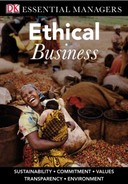Avoiding Greenwashing
“Green” products and “sustainable” business practices are the new buzzwords of the 21st century; but before you make these claims for your own company, you must be sure that they are justified. Consumers are becoming increasingly aware of false claims, or “greenwashing[].”
Greenwashing—to mislead consumers purposefully about the environmental benefits of a product or the environmental practices of a company.Defining the issue
Environmentally friendly products are more popular today than ever before. In the US alone, consumers spend more than $25 billion annually on products sold on their natural or organic credentials. However, as going green has become popular and profitable, more companies have sought to jump on the bandwagon without really changing their environmentally unsound ways. Greenwashing is an unethical, and fundamentally dangerous, practice; consumers have become very savvy about assessing green claims, and will neither forgive nor forget those companies that betray their trust.
Are you greenwashing?
Are you selling a product on the basis of its environmental benefits in one area, while ignoring the negative impacts it has in others?
Can you back up your claim with independent research?
Do the claims you make really mean anything?
Are the green claims you make actually true of all products in the category?
Are you taking credit for a product’s specification or performance, which is in any case mandated by law?
Are you making claims that try to “green” a product in a product category that is not inherently green?
Avoiding risks
When you describe a product or service as “green,” “sustainable,” or “environmentally friendly,” be sure that you can substantiate the claim with specific details and research. Beware of using words in your marketing materials that do not have a clear definition: “eco,” “natural,” “biodegradable,” and “recyclable” are all likely to attract the scrutiny of consumers, and of a number of bodies dedicated to exposing greenwashing.
Today’s educated consumers are looking for a real commitment to sustainability, so avoid one-time “green” programs unless they are truly representative of your company’s values. Above all, reach out to your customers and stakeholders. Get their opinions on how you can change your practices to become “greener,” and what they consider to be sustainable.
Working to standards
In an attempt to reduce the prevalence of greenwashing and to restore consumer faith in businesses’ claims, some organizations have developed certifications to validate and support “green” claims made by companies. One such organization is the Carbon Trust, a UK-based group that works with other organizations to help reduce their carbon emissions. Carbon Trust has developed a green standard that it issues to companies to prove they have reduced their carbon output. The standard does not accept carbon trading as sufficient, as this too has been used as a means of greenwashing. Not only do the companies have to reduce their emissions, they have to continue to reduce them every successive year.
